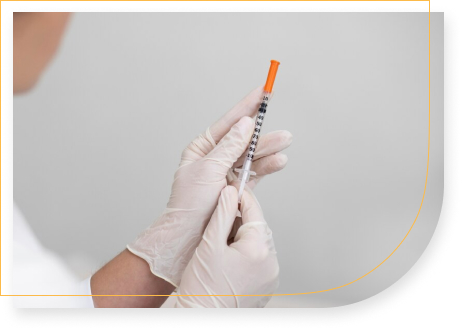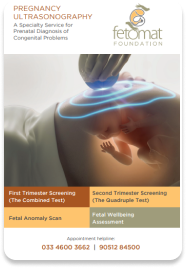
These Tests May Be Necessary For Pregnant Women Who
Have received a high-risk screening result from a screening test ( FTS / Quadruple / Triple Test) for Down syndrome or similar problems
The Test
Amniocentesis is a procedure in which a small amount of the amniotic fluid surrounding the baby in the womb is removed by passing a fine needle through the mother’s abdomen. Amniocentesis is performed after 15 weeks of pregnancy. CVS is a procedure in which a small amount of fetal tissue from the placenta in the womb is removed by passing a fine needle through the mother’s abdomen. CVS is performed at 11-13 weeks of pregnancy.

The Procedure
Both Amniocentesis and CVS are outpatient procedures and do not need admission. In Amniocentesis, using an ultrasound probe for accurate guidance and to ensure a safe distance from the baby, a fine needle is pushed into the skin, through the abdomen and womb, under a local anaesthetic. A small sample (15-20 MLS) of the fluid surrounding the baby is removed using a syringe. This fluid is an amber/yellow color but may sometimes be stained with blood. The needle is then taken out and the baby’s heartbeat is checked on ultrasound. The amniotic fluid containing some of the baby’s cells is sent to the laboratory for testing. In CVS, a small amount of placental sample (Chorionic Villi) is removed using a syringe more or less in the same way. For a very small group of women having Amniocentesis/CVS, not enough fluid / chorionic tissues can be taken and the needle may need to be re-inserted. If your blood group is Rh negative, you will be advised to inject anti-D immunoglobulin after the procedure to prevent you from developing antibodies against the baby’s blood cells. After the procedure, you should rest in the clinic for at least half an hour before going home. You should take it easy the rest of the day. You could resume your normal life from the very next day.
The Risks
Most women say that having amniocentesis / CVS is uncomfortable rather than painful, a bit like period pain. Women describe a sharp stinging feeling when the needle goes in and a feeling of pressure when the needle comes out. You may notice some cramping for a few hours afterwards. This is normal. If you experience any unusual symptoms after the test, such as shivering (as if you have flu), fluid loss, bleeding or contractions, you should seek advice immediately. Every pregnancy carries a risk of miscarriage. Amniocentesis / CVS involves putting a needle through the wall of the womb. It may sometimes cause a miscarriage due to injury or infection in the womb. The additional overall risk of miscarriage is approximately 1%.
The Interpretation
For most women, the laboratory test will give a definite ‘yes’ or ‘no’ answer. The result will let you know, one way or the other, whether the baby has the disorder the test was looking for.
Some women will be informed that the baby has the disorder that the test was looking for. If the results are abnormal, these will be discussed fully with you. For the majority of disorders, there is no treatment or cure. You will need to consider what is best for you and the baby. This might be 3 in 1000 cases (0.3%)
Terminate This Pregnancy
Or continue with the pregnancy and use the information you have gained to help prepare for the birth and aftercare of your baby.

